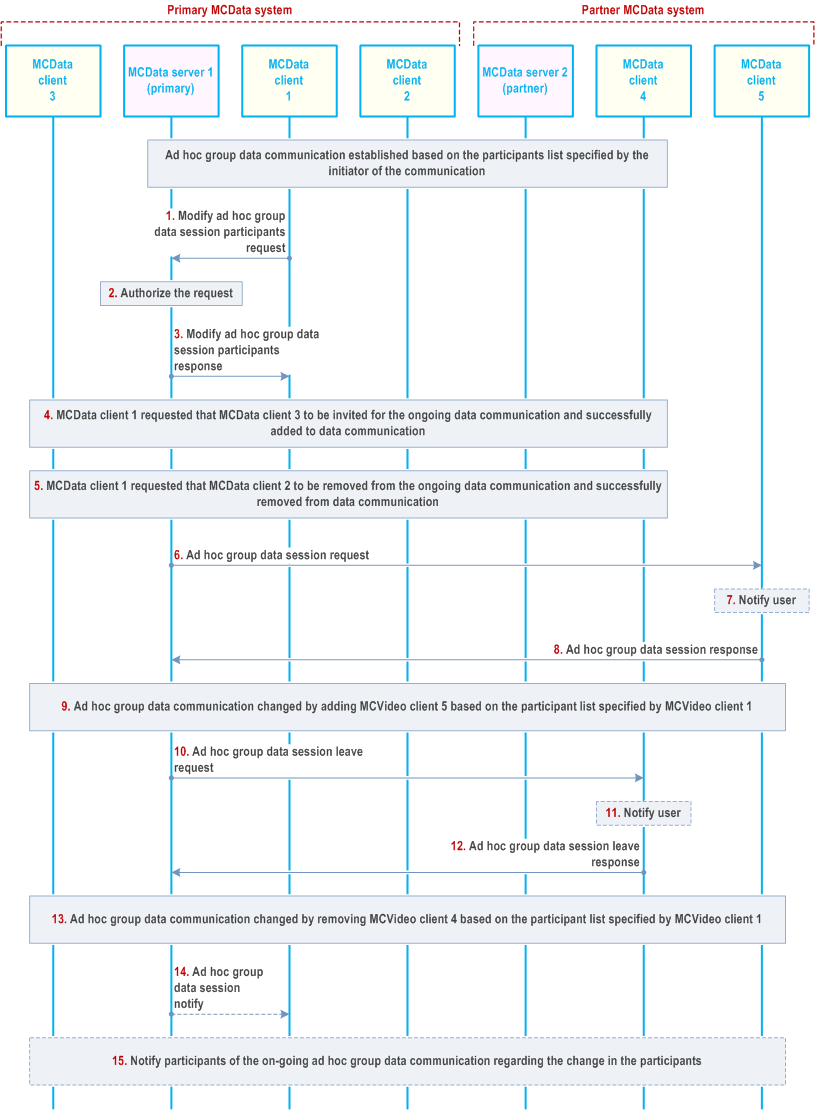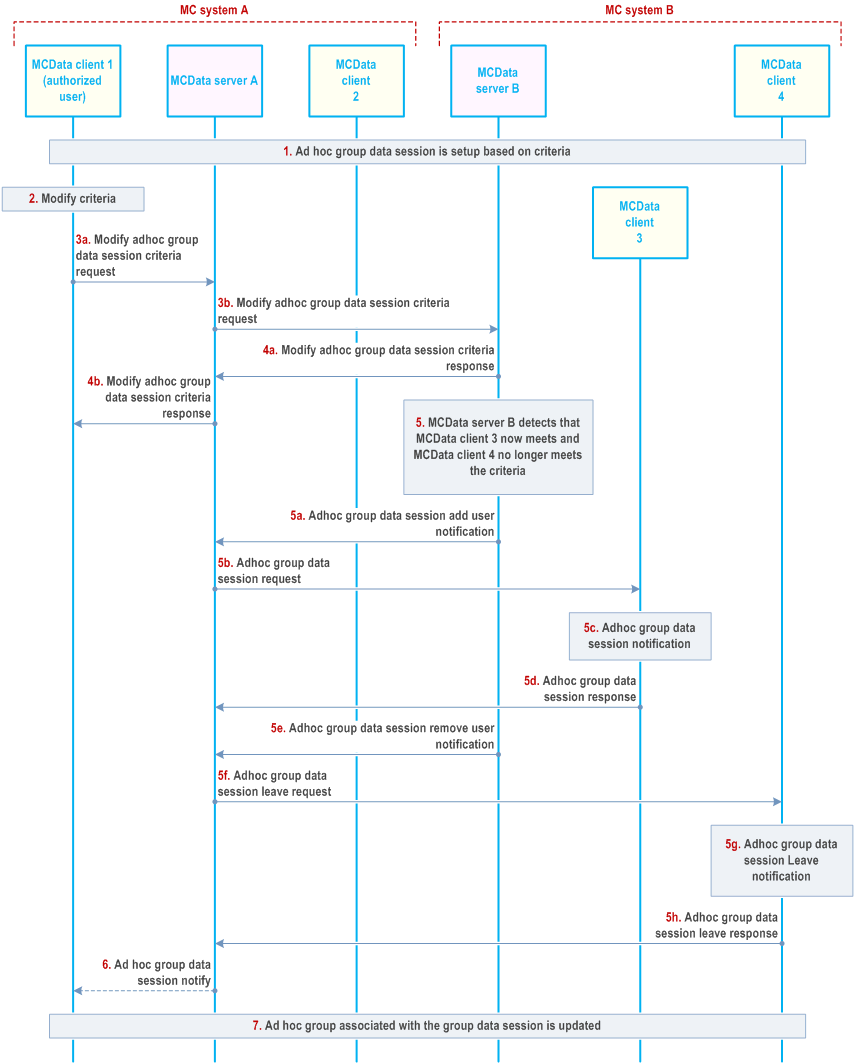Content for TS 23.282 Word version: 19.3.0
1…
5…
6…
6.6…
7…
7.4…
7.4.2.1.10…
7.4.2.2…
7.4.2.5…
7.4.2.8…
7.4.3…
7.5…
7.5.2.1.12…
7.5.2.2…
7.5.2.4…
7.5.2.6…
7.5.2.8…
7.5.2.11…
7.5.2.14…
7.5.3…
7.6
7.7…
7.7.2.1.13…
7.7.2.2…
7.8…
7.9…
7.13…
7.13.3.1.19…
7.13.3.2…
7.13.3.8…
7.13.3.16…
7.13.4…
7.14…
7.14.2.2…
7.17…
7.17.2.13…
7.17.3…
7.17.3.1.4…
7.17.3.2…
7.17.3.2.4…
7.17.3.2.6…
7.17.4…
7.17.6…
7.17.7…
A…
B…
7.17.3.2.6 Modification of ad hoc group data communication participants by an authorized user
7.17.3.2.7 Modification of ad hoc group data session criteria by an authorized user
...
...
7.17.3.2.6 Modification of ad hoc group data communication participants by an authorized user p. 251
Figure 7.17.3.2.6-1 below illustrates the MCData user modifying the ad hoc group data communication participants procedure involving multiple MCData systems.
Pre-conditions:
- An MCData ad hoc group data communication is already in progress the participants list provided by the originating MCData user while initiating the MCData ad hoc group data communication.
- The participants of the MCData ad hoc group data communication belongs to the multiple MCData system.
- The MCData user at MCData client 1 determines that the MCData client 3 needs to be invited to on-going ad hoc group data communication and MCData client 2 needs to be removed from the on-going ad hoc group data communication from the primary MCData system.
- The MCData user at MCData client 1 determines that the MCData client 5 needs to be invited to on-going ad hoc group data communication and MCData client 4 needs to be removed from the on-going ad hoc group data communication from the partner MCData system.

Step 1.
The MCData client 1 sends the modify ad hoc group data session participants request to the MCData server 1 to remove both MCData client 2 and MCData client 4 from the on-going ad hoc group data communication and to add both MCData client 3 and MCData client 5 into on-going ad hoc group data communication.
Step 2.
The MCData server 1 verifies whether the MCData client 1 is authorized to add or remove (modify) the participants of the on-going ad hoc group data communication.
Step 3.
The MCData server 1 sends modify ad hoc group data session participants response to the MCData client 1.
Step 4.
The MCData server 1 determines that MCData client 1 has requested that MCData client 3 from the primary MC system be invited to an on-going ad hoc group data communication and successfully added to the data communication according to the procedure defined in clause 7.17.3.1.4.
Step 5.
The MCData server 1 determines that MCData client 1 has requested that MCData client 2 from the primary MC system be removed from the on-going ad hoc group data communication and successfully removed from data communication according to the procedure defined in clause 7.17.3.1.4.
Step 6.
The MCData server 1 determines that MCData client 1 has requested that MCData client 5 from the partner MC system be invited to an on-going ad hoc group data communication. The MCData server 1 sends the ad hoc group data session request to the MCData client 5.
Step 7.
The MCData client 5 notifies the user about the incoming ad hoc group data communication.
Step 8.
The MCData client 5 accepts the ad hoc group data session request and sends the ad hoc group data session response to the MCData server 1.
Step 9.
The on-going ad hoc group data communication is updated by adding MCData client 5 which is based on the modify participant list provided by the MCData client 1.
Step 10.
The MCData server 1 determines that MCData client 1 has requested that MCData client 4 from the partner MC system be removed from the on-going ad hoc group data communication. The MCData server 1 sends the ad hoc group data session leave request to the MCData client 4.
Step 11.
The MCData client 4 notifies the user of the ad hoc group data session leave request.
Step 12.
The MCData client 4 sends the ad hoc group data session leave response to the MCData server 1.
Step 13.
The on-going ad hoc group data communication is updated by removing MCData client 4, which is based on the modify participant list provided by the MCData client 1.
Step 14.
The MCData server 1 may notify the initiating MCData user of all the users who are added to the on-going ad hoc group data communication. This notification may be sent to the initiating MCData user by the MCData server more than once during the data communication when MCData users join or leave the ad hoc group data communication.
Step 15.
The MCData server 1 may notify the authorized participants about the change in the participants list of on-going ad hoc group data communication.
7.17.3.2.7 Modification of ad hoc group data session criteria by an authorized user |R19| p. 253
Figure 7.17.3.2.7-1 illustrates the modification of ad hoc group data session criteria procedure by the initiator of the ad hoc group data session between multiple MC systems.
Preconditions:
- The MCData user at the MCData client 1 is authorized to modify the criteria.
- The MCData server A and MCData server B are aware of the criteria related to the ongoing ad hoc group data session.
- MC system A and MC system B are interconnected.

Step 1.
The MCData servers continuously check whether other MCData clients meet or if participating MCData clients no longer meet the criteria for the ad hoc group data session.
An ad hoc group data session has been established based on criteria sent by an authorized MCData client upon initiating the ad hoc group data session.
Step 2.
The MCData user at the MCData client 1 is authorized and wishes to modify the criteria for determining the list of ad hoc group data session participants.
Step 3a/b.
The MCData server A receives the modify ad hoc group data session criteria request and forwards the request to MCData server B at MC system B.
Step 4a/b.
The MCData server A receives the ad hoc group data session criteria modify response and forwards the response to MCData client 1 in MC system A
Step 5.
MCData server B detects that MCData client 3 meets the criteria for the ongoing ad hoc group data session initiated at MC system A.
Step 5a.
MCData server B sends an ad hoc group data session add user notification message towards MCData server A.
Step 5b.
MCData server A sends an ad hoc group data session request towards MCData client 3.
Step 5c.
The MCData user 3 is notified of entering an ongoing ad hoc group data session.
Step 5d.
MCData client 3 sends an ad hoc group data session response towards MCData server A.
Step 5e.
MCData server B sends an ad hoc group data session remove user notification message towards MCData server A.
Step 5f.
MCData server A sends an ad hoc group data session leave request towards MCData client 4.
Step 5g.
The MCData user 4 is notified of leaving an ongoing ad hoc group data session.
Step 5h.
MCData client 4 sends an ad hoc group data session leave response towards MCData server A.
Step 6.
The MCData server A may notify the authorised MCData user of all the users who are added to the on-going ad hoc group data session. This notification may be sent to the authorised MCData user by the MCData server A more than once during the data session when MCData users join or leave the ad hoc group data session.
Step 7.
The MCData server A adds MCData client 3 to the ad hoc group data session and removes MCData client 4 from the ad hoc group data session.